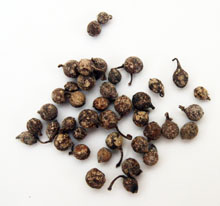Biology:Uzazi

"Uzazi" is the Nigerian name for the 'prickly ash' tree of genus Zanthoxylum tessmannii / Fagara tessmannii / Zanthoxylum gilletii, a member of the Rutaceae family, native to Central and West Africa, and a close relative of the Sichuan pepper. It usually refers specifically to the spice made from its fruit and pericarp, though sometimes other parts of it such as its leaves are used.[1][2][3][4][5][6][7][8][9][10][11]
Each bunch contains 20 to 30 berries. Each berry is round, has a size of 3.5 to 6 mm (1/8 inch to 1/4 inch), has a stalk, and contains a large black seed. The berry turns red when ripe. The berries contain the alkaloid known in Dutch as sanshol.[4][5]
It is described as spicy and pungent, more so than Sichuan pepper, and bitter.[1][5] It is usually used by grinding it into a powder and adding it into soups, stews, seasonings, and sauces.[1][4][12][13] Even in West Africa this is a rare spice[citation needed], and typically only five or six dried fruit are added to a dish.[5]
In herbal medicine, it is used to treat tumors and wounds.[4]
The name of the spice is derived from Igbo, a language in Nigeria, where the spice is grown and harvested on a commercial basis.[citation needed]
References
- ↑ 1.0 1.1 1.2 Evans, Dyfed Lloyd. "Spice Guide Uzazi". https://www.celtnet.org.uk/recipes/spice-entry.php?term=Uzazi.
- ↑ dkunkel (2018-04-20). "Subgroup 028B Fruit or berry". College of Agriculture and Life Sciences, NC State University. https://ir4.cals.ncsu.edu/fooduse/Crop%20Grouping/Type%205%20Herbs%20and%20Spices%20CCPR%2050%202018.pdf#page=16. "HS 3330, Uzazi, Zanthoxylum gilletii (De Wild.) P.G.Waterman, basionym: Fagara tessmannii"
- ↑ "Agenda Item 7(b): REVISION OF THE CLASSIFICATION OF FOOD AND FEED: CLASS A: PRIMARY FOOD COMMODITIES OF PLANT ORIGIN, TYPE 05: HERBS AND SPICES, GROUP 027 HERBS, GROUP 028 SPICES (AT STEP 7)". JOINT FAO/WHO FOOD STANDARDS PROGRAMME, CODEX COMMITTEE ON PESTICIDE RESIDUES, 50th Session: Haikou, PR. China, 9 - 14 April 2017. Prepared by the Electronic Working Group chaired by the United States of America and co-chaired by the Netherlands. Food and Agriculture Organization of the United Nations and World Health Organization. February 2018. p. 18. CX/PR 18/50/7. https://www.fao.org/fao-who-codexalimentarius/sh-proxy/fr/?lnk=1&url=https%253A%252F%252Fworkspace.fao.org%252Fsites%252Fcodex%252FMeetings%252FCX-718-50%252FWD%252Fpr50_07e.pdf#page=18. "HS 3315, Uzazi, Zanthoxylum gilletii (De Wild.) P.G.Waterman, basionym: Fagara tessmannii"
- ↑ 4.0 4.1 4.2 4.3 Vetlesen, Kari (2022-12-08). "uzazi". in Ervik, Finn; Bolstad, Erik (in no). Store norske leksikon. https://snl.no/uzazi.
- ↑ 5.0 5.1 5.2 5.3 "Uzazi" (in nl). 2020-06-13. https://www.ourfood.nl/ingr/grfr_krsp/rutaceae/uzazi.html#gsc.tab=0.
- ↑ "Ladinakeelne nimetus: Zanthoxylum tessmannii (Engl.) Ayafor" (in et). http://taimenimed.ut.ee/cgi-bin/taimenimed.cgi?lang=ld&query=Zanthoxylum%20tessmannii%20(Engl.)%20Ayafor. "Eestikeelne nimetus: Tessmanni koldpuu; saadus (maitseaine): uzazi, puit: olon"
- ↑ The Standing Committee on Plants, Animals, Food and Feed (2018-01-17). "PART B: Other products referred to in Article 2(1)". written at Brussels. replacing Annex I to Regulation (EC) No 396/2005 of the European Parliament and of the Council (Text with EEA relevance). Official Journal of the European Union. - (published 2018-01-23). p. L 18/68. COMMISSION REGULATION (EU) 2018/62. https://eur-lex.europa.eu/legal-content/EN/TXT/PDF/?uri=CELEX:32018R0062&rid=1. "0820020, Sichuan pepper: 0820020-002, Uzazi, Zanthoxylum tessmannii; syn: Fagara tessmannii"
- ↑ Brifo, Kojo (2022-12-01). "Creating Flavors for Africans". Vanguard Media Limited. https://www.vanguardngr.com/2022/12/creating-flavors-for-africans-kojo-brifo/.
- ↑ "Zanthoxylum gilletii (De Wild.) P.G.Waterman". World Flora Online. June 2023. https://wfoplantlist.org/plant-list/taxon/wfo-0000429498-2023-06. "This species name was first published in Taxon 23: 363 (1975) ... Zanthoxylum tessmannii, author: (Engl.) Ayafor, protologue: Pl. Med. (Stuttgart) 50: 210 (1984), https://www.ipni.org/n/urn:lsid:ipni.org:names:972889-1, http://www.worldfloraonline.org/taxon/wfo-0000429464 ... Fagara tessmannii, author: Engl., protologue: Bot. Jahrb. Syst. 46: 406 (1911), https://www.ipni.org/n/urn:lsid:ipni.org:names:773556-1, http://www.worldfloraonline.org/taxon/wfo-0000685011"
- ↑ "Zanthoxylum gilletii (De Wild.) P.G.Waterman" (in en). Royal Botanic Gardens, Kew. http://powo.science.kew.org/taxon/urn:lsid:ipni.org:names:775746-1. "Fagara tessmannii Engl. in Bot. Jahrb. Syst. 46: 406 (1911) ... Zanthoxylum tessmannii (Engl.) Ayafor in Pl. Med. (Stuttgart) 50: 210 (1984) ... Kew Names and Taxonomic Backbone: The International Plant Names Index and World Checklist of Vascular Plants 2023. Published on the Internet at http://www.ipni.org and https://powo.science.kew.org/"
- ↑ "How to make Nigerian Fish Pepper Soup" (in en). 2015-03-24. https://souldeliciouz.com/312/. WARNING: Avast flags this webpage as URL:Phishing, though VirusTotal gives 0 detections.
- ↑ Evans, Dyfed Lloyd. "Cassava Soup". https://www.celtnet.org.uk/recipes/spice-entry.php?term=Uzazi.
- ↑ Evans, Dyfed Lloyd (2007-09-27). "West African Fish Rub". https://www.celtnet.org.uk/recipes/spice-entry.php?term=Uzazi.
 |

